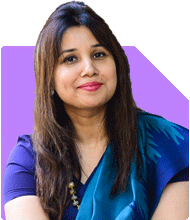Anu Krishna |1746 Answers |Ask -Follow
Relationships Expert, Mind Coach - Answered on Aug 11, 2022
The co-founder of Unfear Changemakers LLP, she has received her neuro linguistic programming training from National Federation of NeuroLinguistic Programming, USA, and her energy work specialisation from the Institute for Inner Studies, Manila.
She is an executive member of the Indian Association of Adolescent Health.... more

Hi Anu, I'm a guest faculty working at a government educational institute.
I have a son who will be 5 years on August 13.
He is very active, smart and kind.
Recently I have noticed him crying and scared of death- Thanatophobia.
Every day in the evening he will start crying thinking the world will end. He will die or me and his Dad will die.
I explained him quiet spiritually that no death can come shiva will protect us. But he is not satisfied.
This particular behaviour of him has started since his school started.
Is this separation anxiety. Please help me how do I make him lead a normal life as he used to be?
Dear NS,
When did this exactly start after he started school?
It helps to go back to that point in time to when this first started to affect him.
Was there a death in the family? A movie that he watched? A story that was narrated to him? Someone in the school shared some content that is frightening?
It is unlikely that he might suddenly have this kind of a fearful reaction.
To assess if this is separation anxiety will require a detailed understanding of his situation.
Children that age as your son can extrapolate one story into another and weave a new story that might have never happened.
Their imagination can take on new dimensions. It will be worth the effort talking to his teachers and the school counsellor.
My suggestion to you is to gather all this information and go to a professional who can handle this.
Is this necessary? YES, as they are trained to deal with fears and panic.
This will help him release these unwanted feelings and breathe easy. Wait no longer.
Till then, surround him with much love and support him by reassuring him that his family loves him no matter what.
All the best!
You may like to see similar questions and answers below
Dr Ashish Sehgal | Answer |Ask -Follow
Relationships Expert, Mind Coach - Answered on May 12, 2023
Aruna Agarwal | Answer |Ask -Follow
Child and Parenting Counsellor - Answered on Jul 10, 2023
Anu Krishna |1746 Answers |Ask -Follow
Relationships Expert, Mind Coach - Answered on Mar 29, 2024
Nayagam P P |10854 Answers |Ask -Follow
Career Counsellor - Answered on Dec 14, 2025
Radheshyam Zanwar |6744 Answers |Ask -Follow
MHT-CET, IIT-JEE, NEET-UG Expert - Answered on Dec 14, 2025
Radheshyam Zanwar |6744 Answers |Ask -Follow
MHT-CET, IIT-JEE, NEET-UG Expert - Answered on Dec 14, 2025
Dr Dipankar Dutta |1840 Answers |Ask -Follow
Tech Careers and Skill Development Expert - Answered on Dec 14, 2025
Dr Dipankar Dutta |1840 Answers |Ask -Follow
Tech Careers and Skill Development Expert - Answered on Dec 13, 2025
Dr Dipankar Dutta |1840 Answers |Ask -Follow
Tech Careers and Skill Development Expert - Answered on Dec 13, 2025
Mayank Chandel |2575 Answers |Ask -Follow
IIT-JEE, NEET-UG, SAT, CLAT, CA, CS Exam Expert - Answered on Dec 13, 2025
Radheshyam Zanwar |6744 Answers |Ask -Follow
MHT-CET, IIT-JEE, NEET-UG Expert - Answered on Dec 13, 2025
Mayank Chandel |2575 Answers |Ask -Follow
IIT-JEE, NEET-UG, SAT, CLAT, CA, CS Exam Expert - Answered on Dec 13, 2025
Mayank Chandel |2575 Answers |Ask -Follow
IIT-JEE, NEET-UG, SAT, CLAT, CA, CS Exam Expert - Answered on Dec 13, 2025

























